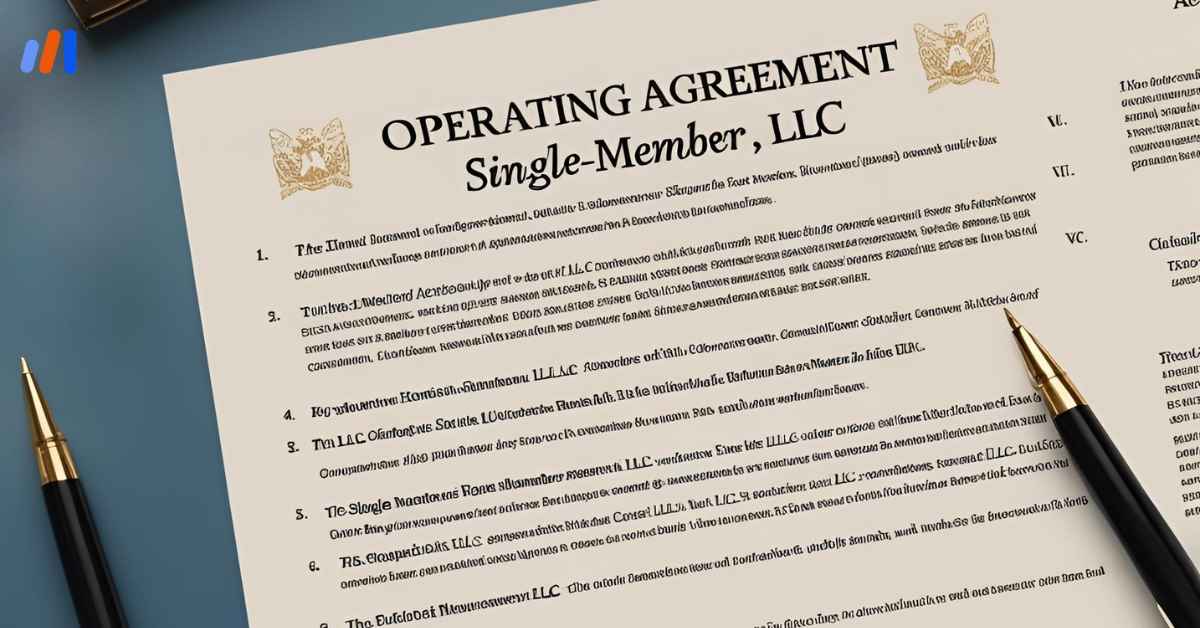What is an Operating Agreement?
An operating agreement is an internal document of an LLC that defines how the business will be organized, its ownership, and how it will operate. This agreement is common in multi-member LLCs, but even a single-member LLC can benefit greatly from having it.
In essence, it functions in the capacity of a legal contract regarding business guidelines covering different facets of the business, along with defining the functions and duties of the owner.
Purpose of the Operating Agreement
As noted before, the purpose of having an operating agreement usually revolves around internal politics. In the case of single-member LLCs, such an agreement works to mark a separation between the owner’s private assets and the company while enhancing credibility in the judgment of any court, financial institution, or other potential investors.
It avoids conflicts, improves ease of decision-making, and ensures conformity to certain minimum requirements imposed by the law.
What is a Single Member LLC Operating Agreement?
A single-member LLC operating agreement is, as the name suggests, a type of operating agreement tailored for a single-owner Limited Liability Company (LLC). This document articulates the legal character of a business entity in terms of its entity and model of management, along with the methods of running the business. It further outlines the character of the business and cements the distinction between personal and business finances.
Although not mandatory in every state, having an operating agreement for single single-member LLC optimizes business operations, portrays professionalism, and minimizes liability risks.
What’s Included in an Operating Agreement for Single Single-Member LLC
An operating agreement for single single-member LLC generally comprises:
- Business Information: Legal name, address, and registration specifics.
- Sole Member Details: The Member’s name, along with their stake in the LLC.
- Business Purpose: A precise explanation of the LLC’s scope of work.
- Management Structure: Specifies if the LLC is manager-managed or member-managed.
- Tax Treatment: Specifies if the LLC is deemed a sole proprietorship or has opted for corporate taxation.
- Capital Contributions: Owner’s initial funding into the business.
- Profit & Loss Allocation: Defines the division of financial returns and expenditure between the owner and the business.
- Banking and Record-Keeping: Business account information and supporting documents.
- Dissolution Procedures: Procedures defining the liquidation process of the LLC.
How Do Single-Member LLCs Maintain Liability Protection?
The main advantage of forming an LLC is liability protection. This can easily become forfeited if proper formalities aren’t followed. An operating agreement for single single-member LLC will ensure that the business is considered a separate legal entity and comes with measures for maintaining liability.
Maintaining liability protection requires:
- Keeping personal finances separate from business expenses.
- Use the LLC’s official name for all business matters.
- Solemnizing the operating agreement with the owner’s signature.
- Keeping accurate business records.
- Filing taxes properly.
Identifying steps as listed allows an LLC to be treated as separate from the owner, allowing personal property to be shielded from business liabilities and lawsuits.
Is an Operating Agreement for a Single-Member LLC Necessary?
Most states, as a matter of law, don’t require single-member LLCs to have an operating agreement. That said, it is advisable to have one. Some banks might need it for business account opening procedures. In case of a legal battle, courts might use it to ascertain the extent to which the LLC functioned as a business enterprise.
An LLC without an operating agreement might default to its state’s preset guidelines, which might not suit the owner’s preferences.
How to Create an Operating Agreement for Single Single-Member LLC
It may require a bit of innovation, but creating an operating agreement for single-member LLCs is not hard. Here are the steps to align with:
-
Basic Information First: Make sure to insert the name and address of your LLC in addition to the formation date.
-
Identifying the Owner: List down relevant details identifying you as the sole member, highlighting your name and title.
-
Management Outline: Explain how you’ll go about running the LLC (generally, it is member-managed).
-
Financial Contributions Section: State all funds and other assets you intend to provide.
-
Tax Treatment Description: Mention if taxation will consider you a sole proprietor or if you exercise another choice.
-
Incorporate Operational Policies: Include protocols for decision-making, approval of expenditures, and organizational structure.
-
Add Procedures for the Dissolution of the Organization: Describe how the business can be shut down if required.
Writing Your Operating Agreement
The operating agreement should be written in formal language. It does not, in most states, need a notary; however, the sole member must sign and date the document. A legal professional or template may be utilized to ensure the document is accurate and meets all necessary legal criteria.
Make sure your document:
- Consistently uses your LLC’s legal name.
- It is up to date and accurate.
- It is complete based on all necessary sections highlighted above.
Should I Have an Operating Agreement for My Single-Member LLC?
Highly recommended. While not obligatory, an operating agreement for single-member LLCs provides another layer of protection for business and personal assets, adds legitimacy to the structure, provides support for internal organization, outlines business processes, company framework, and proves that the LLC has been properly organized.
An operating agreement will help facilitate:
- Business legal disputes.
- Provide clarity on finances.
- Support compliance for lenders or investors.
- Strengthen limited liability protections.
When Can You Use a Single-Member LLC Operating Agreement?
Use your operating agreement:
- To open a bank account specifically for the business.
- To acquire credit or loans for the business.
- In judicial matters related to the separation of individuals from their accounts.
- For purposes of return submissions and checks.
- To clarify the will.
- As a basis for further decisions of your business and in matters to legally safeguard it through its development.
Making Changes to Your Operating Agreement
Because of technological improvements, a business may modify its operating documents at some point. The following are frequent causes:
- Change in the principal place of business.
- Reclassification of the business for tax purposes.
- New capital subscriptions.
- Change in the statement of the aims of the company.
To make amendments:
- Look over what your agreement is.
- Prepare amendments detailing the proposed changes in a precise manner.
- Sign and date the amendment.
- Store it securely alongside official business documents.
How an Operating Agreement Protects Your Assets
An operating agreement is critical, as within an LLC it constitutes a limited liability company requested by demonstrates the difference between a business and the individual. These types of documents are essential for the business as well as a court for making decisions to overrule the limited liability that the company shields itself from in conflicts surrounding its operations.
With a well-established agreement, it’s ensured and shown that the:
- The company is limited to the owner, marking it as controlled.
- Form is exhibited to be maintained.
- Deals in a circulatory manner with commercial activity, payment, and services.
So in return, your possessions, such as your home or the savings you have, are protected against debts or possible litigations that can arise with the business.
Single-Member LLC Operating Agreement Template
SINGLE-MEMBER LLC OPERATING ORDER AGREEMENT
Article I: Company Formation
This Operating Agreement will be executed on [Date], for and on behalf of [Your Name] as the single member of [LLC Name], organized in the State of [State].
Article II: Sole Member
The Sole Member shall be [Your Name], whose address is [Address].
Article III: Business Purpose
This LLC is to carry out [Describe Purpose].
Article IV: Term
The LLC shall continue until it is dissolved as per the provisions of this agreement.
Article V: Management
The sole member shall manage the LLC.
Article VI: Tax Treatment
The LLC shall be considered for federal tax purposes as a disregarded entity.
Article VII: Capital Contributions
The amount of [Amount] shall be regarded as an initial capital contribution by the sole member.
Article VIII: Distributions
The profit and loss shall be solely borne by the member.
Article IX: Records and Banking
The LLC shall have its own records and accounts separate from the member.
Article X: Dissolution
On dissolution, assets shall be distributed considering applicable laws.
FAQs About Operating Agreements for Single-Member LLCs
1. Does a single-member LLC need to have an operating agreement?
There is no legal prerequisite; however, it is best practice to ensure legal shielding and credibility are upheld.
2. Can I create my own operating agreement?
Indeed, however, guidance from professionals or using a template is preferable.
3. Do I need to submit my operating agreement to the state?
There is no necessity. You simply need to store it within your business documentation.
4. Is it possible to make changes later on?
Yes, as long as you write and sign an amendment.
5. Are operating agreements usually needed for banks?
In most cases, yes, particularly when a business account is being opened.
Conclusion: The Value of an Operating Agreement for Single-Member LLC
Developing an operating agreement for single single-member LLC is an optimal operational decision, especially when it comes to protecting personal assets, improving business operations, and establishing personal credibility. Even in the absence of legal requirements, an operating agreement provides an LLC with a framework to legally and operationally conduct business, thus solidifying its foundational principles.
Don’t wait to establish an operating agreement until challenges arise. Instead, draft one and periodically revisit it, as doing so can help protect one’s future.
File Your LLC Today
25$ off with a coupon
Lock in EasyFiling's transparent rates and get lifetime compliance support at no extra cost.
Get Started Now








